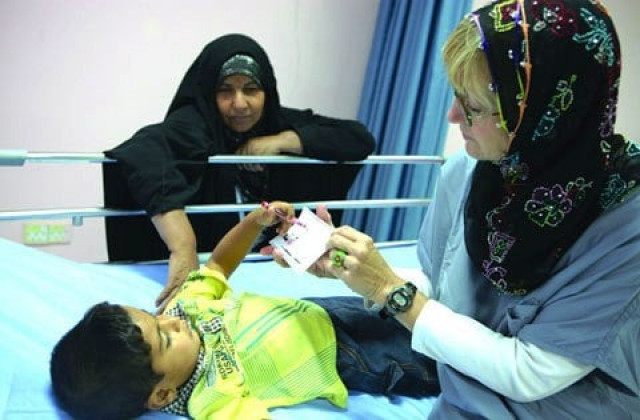Still raw wounds greet US medics in Iraq’s Fallujah
Both researchers and local doctors have linked an increase in birth defects to the battles fought in Fallujah.

The decision was not easy for Fallujah, which lies just west of Baghdad and still views the United States with bitterness and extreme distrust.
Residents point the finger at US weaponry for causing a rise in birth defects, mainly congenital heart problems, still occurring years later.
Yet when Fallujah General Hospital opened a new cardiac catheterisation laboratory in July, it was American doctors who helped launch it and test the equipment.
“I am an educated man,” said Firas al-Kubaisy, a Fallujah native and one of the hospital’s paediatric cardiologists. “So I know the American people are different from their politicians.”
But “our population, they feel something in their hearts. They do not understand what is going on. When they hear there is an American team in our city, they are surprised they are helping us.”
The six-member team -- two doctors and four nurses -- spent several days here in July, sequestered inside the hospital where the normal Iraqi police guard was boosted during their stay, said hospital director Abdulsattar Kadhim Lawas.
The team’s head Kirk Milhoan, a former Air Force surgeon who completed two tours in Iraq in 2005 and 2007, said he was frank with Iraqi colleagues.
“You know, ‘How many of your friends, how many of your relatives, have been affected by Americans and coalition forces, and also how many sleepless nights did we give you?’,” Milhoan asked them.
After the US invaded Iraq in March 2003, Fallujah, a city of about a half million people, staged some of the earliest anti-American protests though they were largely peaceful.
In 2004, however, four Americans employed by the private US security firm Blackwater, now called Academi, were brutally killed. Pictures of their bodies, mutilated, set alight then hanged from a bridge over the Euphrates, were seen worldwide.
The US response was swift and ruthless. In April, American forces launched an offensive to quell a burgeoning Sunni insurgency but it failed. Fallujah became a fiefdom of Al-Qaeda and its allies, who essentially controlled the city.
A subsequent campaign in November saw some 2,000 civilians and 140 Americans killed in a battle considered one of the fiercest for US troops since the Vietnam war.
Kubaisy, 36, sitting board examinations at the time, escaped the worst as did his family. “They went to Baghdad because Baghdad was safer at that time.” But his home? “It’s gone,” he said simply. And the land? “I left it.”
The fighting “was unnecessary”, Kubaisy feels, adding: “I am not just blaming the US army at that time, but (also) our people, our governorate, our ministers.”
Both researchers and local doctors have linked an increase in birth defects to the battles fought in Fallujah.
In December 2010, a study in the International Journal of Environmental Research and Public Health said, “birth defects, with a prevalence of congenital heart defects and neural tube defects, have reached... unprecedented numbers.”
In the sole month of May that year, birth defects were present in 15 percent of all deliveries in Fallujah General Hospital, the study said.
“These defects could be due to environmental contaminants which are known components of modern weaponry,” it concluded.
Medics and officials in Fallujah, however, including hospital director Lawas, have no doubt the defects have been caused by the US forces’ alleged use of depleted uranium rounds in 2004.
“Fallujah has seen many wars, and it was attacked twice by American troops, and many weapons were used in this city,” said Lawas. “We think that there is a link between those weapons and the diseases.”
The American legacy here was a problem for Jeremy Courtney, whose charity Preemptive Love, based in the Kurdish city of Sulaimaniyah, helped organise the US medical team’s visit last month.
“No one wanted an American coming traipsing through the streets, even if it was ostensibly to try and help people,” Courtney said of attempts to send in a medical crew several years ago.
Even when local authorities finally agreed, the US medics’ movements were limited to the hospital compound and the locals’ reception was mixed.
Some people complained they found out too late, given the team’s limited stay.
“I only heard recently that US doctors were here,” said 43-year-old Mehdi al-Rubaye, holding 15-month-old Ahmed who has a hole in his heart. “I told my son: ‘At last your heart will be healed.’
“But now I have been told they will not see him, and I do not know what I will do.”
Others were simply not pleased.
“The Americans did not bring humanitarianism or democracy, they did nothing good for us,” said 28-year-old engineer Omar Abid Ouda. “Even if they brought all of America to Fallujah to help us, what they did was far more cruel than anything we have seen in our lives.”
Ouda not only lost his father and brother in the battles, his wife of two years recently gave birth to a boy with a heart defect.
“I would rather let my son die than go to the Americans,” he said.



















COMMENTS
Comments are moderated and generally will be posted if they are on-topic and not abusive.
For more information, please see our Comments FAQ